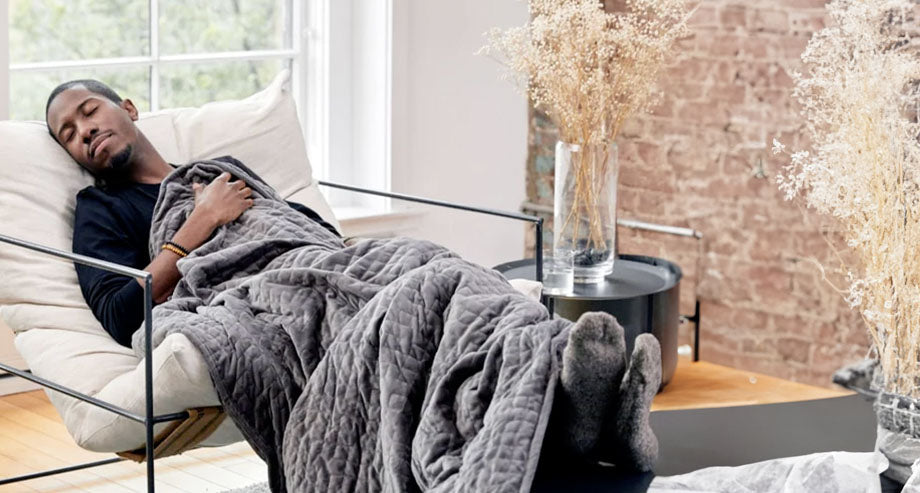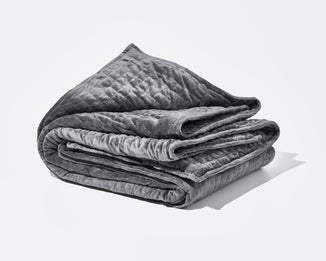
Oct 25, 2023
REM vs. Deep Sleep: Is There a Difference?

Yes, there is a difference between REM and deep sleep, and understanding this distinction is helpful for anyone seeking to improve their sleep hygiene and overall health. While both REM and deep sleep are essential components of a good night's sleep, they serve different purposes and are associated with different physiological processes.
For example, deep sleep is critical for physical restoration, while REM sleep is essential for emotional and cognitive well-being. In an ideal sleep cycle, time is properly distributed between each sleep stage to ensure that you're getting the right amount of quality sleep.
Interruptions or imbalances in these stages may interrupt healthy sleep and could have repercussions on your well-being. It's not just about getting enough sleep. Each stage of sleep contributes uniquely to health, making it important to understand how they differ and why each is important.
Let's explore this topic more.
Introduction to Sleep Stages and Sleep Cycles
Sleep physiology is a multifaceted process that cycles through various stages, each serving its role in your mental, physical and emotional well-being. From deep sleep to REM sleep, each stage in the sleep cycle offers its own set of benefits and characteristics. Understanding these stages helps you understand how much sleep you need, the quality of sleep you're getting and what happens if your sleep patterns are disturbed.

The Basics of Sleep Cycles
Sleep cycles consist of alternating periods of non-REM and REM sleep that typically last between 90 to 120 minutes. Each night, you'll likely pass through four to five cycles, assuming you get enough quality sleep.
- Non-REM sleep encompasses stages of lighter to deeper sleep, important for physical restoration.
- REM sleep accounts for about 25 percent of your total sleep time and is vital for emotional and cognitive functioning.
- The composition of each sleep cycle changes as the night progresses. For example, early cycles have more deep sleep, while later cycles feature more REM sleep.
- You can track your sleep cycles using a smartwatch and app.
Understanding the Role of Each Sleep Stage
Each stage of sleep serves specific functions in maintaining your health. Non-REM sleep, broken down into three or four stages depending on the classification system, is essential for physical restoration — such as tissue repair and muscle growth. It's also vital for cognitive skills like memory consolidation and attention.
- Stage 1 is the lightest and is usually brief, setting the stage for deeper sleep.
- Stage 2 involves slowed brain waves with specific bursts of activity, possibly linked to memory and learning.
- Stage 3, the deepest stage, is when the most restorative processes occur.
REM sleep, on the other hand, is characterized by rapid eye movement and is the stage when dreaming occurs. Your brain activity during REM sleep is similar to when you're awake, making it critical for emotional regulation and cognitive performance.
- REM sleep enhances mood and sharpens the mind, preparing you for emotional and mental challenges.
- It's the stage of sleep most closely associated with dreaming, and vivid dreams often occur during REM sleep.
Key Differences Between REM and NREM Sleep
While both REM and non-REM sleep are necessary for health, they serve different purposes. Non-REM sleep is primarily concerned with physical restoration. Muscle tone decreases, and brain waves slow down as you move from lighter to deeper stages.
- Non-REM stages are where you spend most of your sleep time.
- Physical repair and growth mainly occur in these stages.
REM sleep, by contrast, is more about mental restoration. It involves increased brain activity, rapid eye movement and low muscle tone. REM sleep is essential for mood regulation, memory consolidation and cognitive functions.
- REM sleep typically makes up about 25 percent of total sleep and often occurs later in the sleep cycle.
- Your eyes move rapidly in various directions during this stage, hence the name "Rapid Eye Movement" sleep.
Understanding these key differences can help you track your sleep and even identify potential sleep disorders like sleep apnea or sleep deprivation. It also provides a foundation for understanding how lifestyle choices, such as diet or exercise, can affect your sleep.
Try Our Knitted Weighted Blanket Today!
Deep Dive into Deep Sleep
Deep sleep is a main component of your sleep cycle, serving as the most restorative stage for your physical well-being. Often referred to as stage 3 or N3 sleep, deep sleep is when the body undergoes essential processes such as tissue repair, bone and muscle building and immune system strengthening. During this stage, your muscle tone, pulse and breathing rate all decrease, allowing the body to focus on recovery and repair. Understanding the importance of deep sleep can help you prioritize it to help improve sleep quality and waking up truly rejuvenated.

The Importance of Deep Sleep
Deep sleep is the deepest stage of non-REM sleep. It plays a vital role in physical restoration, tissue repair and immune system strengthening. This stage of sleep is not just about getting enough hours on the clock. It's about the quality of sleep you receive. During deep sleep, muscle tone, pulse and breathing rate decrease, allowing the body to focus on recovery and repair.
- Physical Benefits: Your body repairs and regrows tissues, builds bone and muscle and strengthens the immune system during deep sleep.
- Cognitive Benefits: Deep sleep is also essential for cognitive skills such as attention, learning and memory consolidation.
How Much Deep Sleep Do You Need?
Most adults need about 1.5 to 2 hours of deep sleep per night, which accounts for roughly 13-25 percent of total sleep time. However, the amount of deep sleep you need can be influenced by various factors such as age, genetics and overall health. If you're not hitting the target, it could lead to sleep deprivation, affecting both physical and cognitive functions.
What Disrupts Deep Sleep?
Several factors can hinder your ability to reach or maintain deep sleep, ultimately affecting sleep quality. Sleep disorders like sleep apnea, insomnia and other conditions such as anxiety or stress can disrupt this stage of sleep. External influences like light, irregular sleep schedules and certain medications can also be culprits.
Understanding the factors that disrupt deep sleep and taking measures to mitigate them can significantly improve your sleep quality and overall well-being.

Exploring the World of REM Sleep
REM sleep, or Rapid Eye Movement sleep, is a stage of the sleep cycle characterized by several distinguishing features like rapid movement of the eyes, low muscle tone and vivid dreams. This stage usually kicks in within the first 90 minutes of falling asleep and recurs several times throughout the night. As part of the larger sleep cycle — which also includes light sleep, deep sleep and other non-REM sleep stages — REM sleep plays specific roles in cognitive function, emotional regulation and overall well-being.
Functions of REM Sleep
REM sleep is more than just a phase you go through every night. It's a complex stage that has a direct impact on your mental sharpness, emotional stability and even your physical health. Let's dive into the specific functions that make REM sleep indispensable.
- Memory Consolidation: REM sleep aids in the process of memory consolidation, making it essential for learning and retaining information.
- Emotional Regulation: This stage helps in processing emotional memories, affecting your emotional well-being.
- Cognitive Performance: Your creativity and problem-solving skills are positively impacted by REM sleep.
- Physical Restoration: Physical repair and tissue growth happen during REM.
- Brain Development: Particularly important in infants and children, REM sleep aids brain development.
- Mood Regulation: Lack of REM sleep has been linked to mood disorders like depression and anxiety.
Necessity of REM Sleep in a Sleep Cycle
You might wonder why REM sleep is such a non-negotiable part of your sleep cycle. Well, it serves as a cornerstone for many of your body's essential functions — from storing memories to repairing tissue. Let's explore the reasons that make REM an indispensable part of your overall sleep routine.
- Learning and Memory: It helps in the consolidation and storage of memories, crucial for learning.
- Emotional Balance: Affects your emotional well-being by helping process emotional information.
- Physical Health: REM sleep contributes to physical restoration, including tissue repair.
- Brain Function: It supports brain development, especially in younger individuals.
- Mental Health: Lack of REM sleep can contribute to mental health issues like anxiety and depression.
- Brain Filtering: During REM, the brain filters and prioritizes neural connections made during the day.
Experience Cooling Weighted Blanket Comfort
How Sleep Quality Affects Overall Health
Understanding sleep quality is a smart step toward maintaining good health. Sleep quality encompasses not just the amount of sleep you get, but also the various stages of sleep you experience, like REM sleep and deep sleep. Each stage serves a distinct function, and missing out on any can have detrimental effects on your well-being.

Link Between Restorative Sleep and Health
Restorative sleep is essentially the kind of sleep where both your mind and body recover and rejuvenate. It’s needed for many aspects of your health, including mental acuity and physical well-being.
- Physical Restoration: The deep sleep stage of non-REM sleep is vital for physical restoration. It's the time when your body focuses on repair and growth of tissues, bone and muscle.
- Cognitive Benefits: Both REM sleep and non-REM sleep contribute to cognitive functions like memory consolidation and learning. REM sleep, in particular, is essential for emotional regulation and complex problem-solving.
Getting More REM and Deep Sleep for Optimum Rest
Achieving a good balance between REM sleep and deep sleep is necessary for optimal health and well-being. While both stages serve roles in mental and physical restoration, their proportions within a sleep cycle need to be balanced for restorative sleep. Understanding how much REM sleep and deep sleep you need — coupled with strategies to achieve these sleep stages — can elevate your sleep quality.
Strategies for Achieving Balanced Sleep Stages
To have a balanced distribution of REM and deep sleep, you may need to adjust your lifestyle. Consider the following:
- Sleep Schedule: Consistency is key. Stick to a regular sleep schedule so your body’s internal clock can help you enter different stages of sleep more easily. This aids in getting enough REM and deep sleep.
- Sleep Environment: Make your bedroom conducive for sleep. A cool, dark and quiet room aids in sleep quality and allows you to cycle through different stages of sleep more effectively.
Sleep Accessories to Improve Sleep
Selecting the right sleep accessories can make a tangible difference in the quality of your sleep and in achieving balanced sleep stages. These accessories not only enhance your comfort but also can positively influence sleep patterns and promote restorative sleep.

- Weighted Blankets: Weighted blankets use deep touch pressure to promote relaxation and reduce stress. Available in various weights and sizes, they can also be specialized for certain conditions like cooling or added comfort. Investing in a cooling weighted blanket if you sleep warm or a knitted weighted blanket for added coziness can improve deep sleep stages and overall sleep quality.
- Heated Massage Guns: A heated massage gun combines heat and vibration to ease muscle tension and promote relaxation. These devices help transition you to relax and relieve soreness, making it easier to slip into deep and REM sleep stages. They are versatile enough for use on areas like the neck, shoulders and back. Adding one to your sleep routine can result in a more balanced sleep cycle.
- Infrared Sauna Blankets: These cocoon-like blankets use far infrared technology for relaxation and detoxification. Easy to use and designed for home settings, an infrared sauna blanket can improve your sleep by reducing stress and promoting relaxation. Incorporating one into your sleep setup can enhance sleep quality and balance sleep stages.
- Weighted Eye Sleep Masks: Weighted eye sleep masks apply gentle pressure around the eyes to aid in relaxation and stress reduction. They also block out disruptive light, further improving sleep quality. Using one can help you achieve deeper and more balanced sleep stages.
When to Seek Professional Help for Sleep Disorders
If you’re struggling to get balanced sleep despite trying various strategies, you may have a sleep disorder like sleep apnea or insomnia.
- Identifying the Signs: Symptoms like snoring loudly, experiencing leg cramps or having difficulty falling and staying asleep may indicate the need for professional intervention.
- Taking the Next Steps: If you are experiencing symptoms of sleep disorders, keep a sleep diary to track your sleep patterns. Discuss these findings with your healthcare provider, who may refer you to a sleep specialist for further evaluation.
Don't ignore the symptoms. Consult healthcare professionals if you suspect that you might have a sleep disorder, as this can severely affect your sleep quality and overall health.
Wrapping Up: Your Action Plan for Quality Sleep
You've learned a great deal today about the intricacies of sleep, the roles of REM and deep sleep and how each contributes to your overall well-being. Armed with this knowledge, you can now take targeted steps to improve not only the amount but the quality of your sleep. Whether it's tweaking your lifestyle or exploring sleep accessories to enhance your sleep environment, your pathway to restorative sleep is within reach. Prioritize education and take action to ensure better sleep and, consequently, better health. Keep going — you're on the right track.
Your use of this website, its content, and any products obtained through this website is at your own risk. This website, its content, and any products obtained through this website are provided on an “as is” basis, without any warranties of any kind, either express or implied, including warranties of merchantability, infringement of intellectual property, or fitness for any particular purposes. No warranty or representation is made with respect to the completeness, reliability, quality, or accuracy of this website or its content. This website, its content, and any products obtained through this website do not constitute medical treatment and is not a substitute for a medical examination or diagnosis. If you are dealing with a health condition check with your health care provider before using. This website may contain affiliate links that allow us to earn a commission on purchases made through such links. We may accept forms of advertising or sponsorships in connection with this website. There might also be paid topic insertions. We may accept and keep free products, services, and other forms of compensation from others.
Image Credits:
fizkes/Shutterstock.com
BaanTaksinStudio/Shutterstock.com
Ground Picture/Shutterstock.com
Studio Panteon/Shutterstock.com


